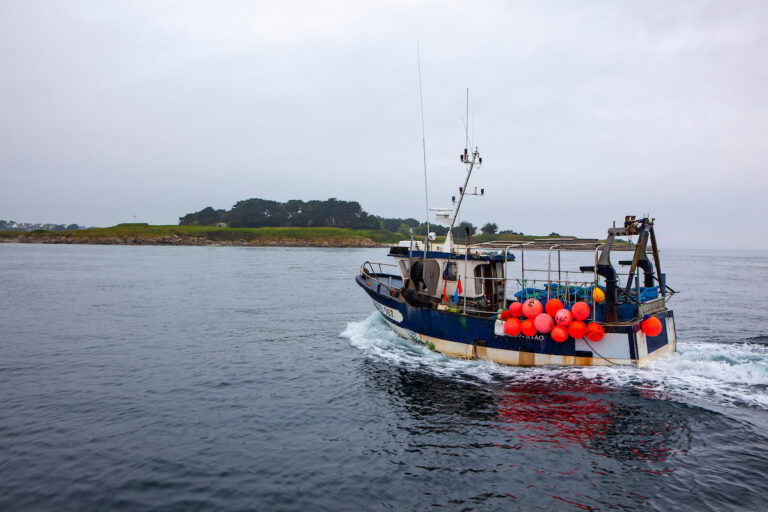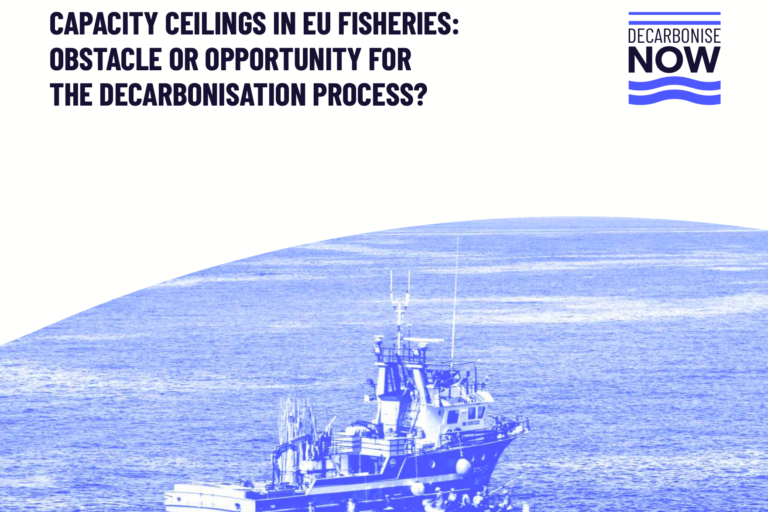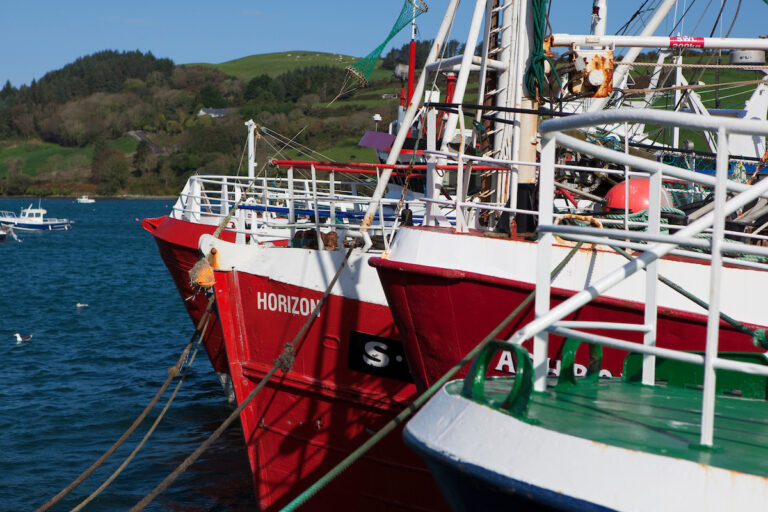
New Report Debunks Fishing Industry Arguments Against Decarbonisation
Brussels, 29 October 2024:- A new report from ClientEarth reveals that limits on vessel weight and power under EU’s Common Fisheries Policy (CFP) prove no obstacle to switching the EU fishing fleet to energy-efficient and low-carbon propulsion technologies.
The report, Capacity Ceilings in EU Fisheries: Obstacle or Opportunity for the Decarbonisation Process? prepared by RISE Research Institutes of Sweden on behalf of ClientEarth, assesses – and debunks – claims raised by the fishing industry and some policymakers that capacity ceilings may hamper the industry’s transition away from fossil fuels. It also finds that the intention behind capacity limits set out in EU legislation can be aligned with decarbonisation of the fleet and are of no hindrance to decarbonisation.
“This report proves that the EU’s capacity ceilings for fishing vessels in no way impedes decarbonisation of the sector – contrary to fishing lobby claims. The energy transition of the fishing sector is not just an environmental necessity, it is a critical step for ensuring the long-term resilience of the industry”, said Laurène Provost, Lead Lawyer at ClientEarth. “By adopting energy-efficient technologies and transitioning to cleaner fuels, the EU fishing sector can safeguard its future against climate change impacts while maintaining the health of marine resources.”
“This report makes clear that while decarbonisation of EU fishing fleets may require initial investments and adaptation, the necessary regulatory flexibility is already in place”, said Provost. “The remaining capacity provides a unique opportunity for Member States and the fishing industry to invest in sustainable practices that align with both climate goals and the long-term sustainability of fish stocks”.
“Given the climate and biodiversity crisis and the need to ensure the long-term viability of EU fisheries, setting a strict deadline for the phasing out of fossil fuels in the sector, including removal or redirection of subsidies to favour a just transition, can create incentives and speed up the process towards carbon neutral fuels while also contributing to broader objectives”, added Provost. “The findings of this report are important in the context of the roadmap for decarbonising EU fisheries, which the Commission is due to publish by 2025, instead of its originally announced 2024 publication.”
“Actions identified as necessary to meet the purpose behind the capacity ceiling, such as reduction of overcapacity, are in fact aligned with decarbonisation opportunities”, said Sara Hornborg, Sustainable Seafood Researcher at RISE, one of the report’s authors. “Promoting energy efficiencies through decreasing overcapacity, sustainable exploitation of stocks and shift in gears are important first steps towards decarbonisation, and depending of fishing fleet, the extra space needed for use of alternative fuels may not be that large.”
About Capacity Ceilings
Under the CFP’s Article 22, capacity ceilings limit the overall size or storage volume of the fishing vessels (in gross tonnage (GT)) as well as engine power (in kilowatts (kW)). These capacity ceilings are established for each EU country, and new fishing vessels may enter the fleet only after the same fleet capacity (in kW and GT) is removed.
The EU system of capacity ceilings aims to maintain stability of the EU’s fleet capacity, in order to avoid having too many vessels chasing too few fish, which can lead to overfishing and depleted fish stocks. By capping the size and power of fishing fleets, the EU aims to balance the fishing effort with sustainable fish stock levels.
However, concerns raised mainly from within the fishing industry suggesting that these limits might restrict the adoption of alternative energy solutions. These arguments state that such solutions, like hybrid engines or biofuels, often may require more space or power than traditional diesel engines, potentially challenging these capacity limits. However, the findings of the report challenge this presumption.
Key Findings:Available capacity for decarbonising the sector:
- The report finds that current capacity ceilings are not a hindrance for decarbonisation of fishing fleets, as capacity is available within the regulatory framework. Additionally, the purpose of capacity ceilings may be seen as a facilitator for an energy transition.
- Action plans set out when there is unbalance between fishing capacity and available fishing opportunities within a given fleet segment. This may become an opportunity to boldly tackle the energy transition within the sector, even if technological questions remain open.
- Under the CFP, action is required to decrease overfishing for all case study fleets, which would also favour energy efficiency.
- A full decarbonisation of the fishing fleet would particularly affect those with a high energy demand – especially large vessels operating in distant waters – but may still be small in terms of the effect on gross tonnage depending on fishing pattern.
- It is still unknown to which extent individual vessels may accommodate all changes required from either hybrid-solutions or full decarbonisation, and the effect on operations. This calls for more detailed technological analysis on what characterises best available technology for different fisheries.
Decarbonisation options:
- Energy audits and monitoring of energy use of individual vessels should be required
- Energy use must be reduced as far as possible before converting a vessel to alternative fuels, requiring better understanding of a vessel’s optimum operational pattern.
- For around €4,500, monitoring devices may be installed to initiate this process and offer quick return on investment in the form of energy saving.
- Measures improving the energy efficiency alone may achieve a 30% reduction in fuel use for all fleets without affecting fishing capacity. It is however crucial that this energy saving is not used to increase fishing effort and thus negatively affect an already identified biological imbalance for several of the fleets.
Decarbonisation as a key step for long term resilience of the sector:
- Decarbonisation is a gradual process – spanning from fishery management to individual fishers and back again – crucial for initiating achievement of long-term sustainable fisheries. Eliminating overcapacity and overfishing by fishery management actions provides the prerequisites for long-term sustainability.
- From a vessel perspective, combining energy efficiencies with hybrid-solutions has potential to reduce emissions with 79% relative to current baseline. Here, tailored solutions for different fleets will be crucial, which is also needed for full decarbonisation.
- Opportunities exist to increase GT or kW relative to capacity ceilings if required for decarbonisation measures but links back to fishery management – it is crucial that the fleets maintain in balance or decrease in fishing capacity (e.g., effort, catch capacity) to avoid overfishing.
Alignment with the objectives of the CFP and climate goals
- Overall, taking steps towards decarbonisation align with the objectives of the CFP – i.e., win-win actions for climate and long-term sustainable fisheries.
- The energy transition can be aligned with action plans for case study fleets in the report, e.g., allocating more fishing opportunities to the passive gear segment in the Italian small-scale fleet, and also other objectives such as Article 17 of the CFP.
- Given the urgency of curbing climate change, and the need to ensure long-term viable fisheries, setting a strict deadline for the phasing out of fossil fuels for all maritime operations, including removal or redirection of subsidies to favour a just transition, can create incentives and speed up the process towards carbon neutral fuels while also contributing to broader objectives.
ENDS
Contact:
Dave Walsh, [email protected], +34 691 826 764




